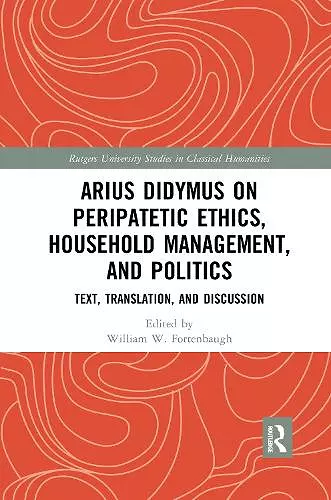Arius Didymus on Peripatetic Ethics, Household Management, and Politics
Text, Translation, and Discussion
Format:Paperback
Publisher:Taylor & Francis Ltd
Published:30th Jun '20
Currently unavailable, and unfortunately no date known when it will be back
This paperback is available in another edition too:
- Hardback£145.00(9781412865531)

This volume features a unique epitome (original summation) of Aristotelian practical philosophy. It is often attributed to Arius Didymus who composed a survey of Peripatetic thought on three closely related areas: ethics, household management, and politics. The quality of the epitome, which draws not only on the surviving treatises of Aristotle, but also on works by later Peripatetics, is excellent.
In recent years the epitome has attracted increased attention as an important document for the understanding of Hellenistic philosophy. This new edition of the Greek text is much needed; the most recent edition dates from 1884 and is seriously faulty. This translation, provided by Georgia Tsouni, is based on the oldest and best manuscripts and takes account of recent discussions of difficult passages. In addition, an English translation appears opposite the Greek text on facing pages. The text-translation is followed by nine essays, which are written for a wide audience—not only philosophers and classicists, but also scholars interested in politics and social order.
The essays also consider issues of a more philological nature: Who in fact was the author of the epitome? Is Theophrastus an important source? In discussing political matters, is the author intending to defend the practice of philosophy in Augustan Rome? Was there a second epitome, perhaps with a different slant, that has been lost?
This volume is a welcome contribution to the study of Arius Didymus’ challenging compendium of Hellenistic ethics and only the second study to focus on this work since 1981. It offers a new edition of ‘section C’ on Peripatetic ethics, a discussion of the author’s identity, and a well-selected set of aspects examined by experts in the field, exploring various themes and connections with Aristotle’s works, ethical concepts such as virtue, the worth of others, external goods and types of life. The volume closes with a masterful essay in which Seneca’s Letter 85 is used as indirect evidence for Peripatetic ethics in the first century. While not all questions on this work can be resolved, this volume certainly assists in a more detailed understanding of the complexities, questions and transmission of Peripatetic ethics in the early Empire.
- Han Baltussen, University of Adelaide, Australia
ISBN: 9780367594589
Dimensions: unknown
Weight: 480g
360 pages